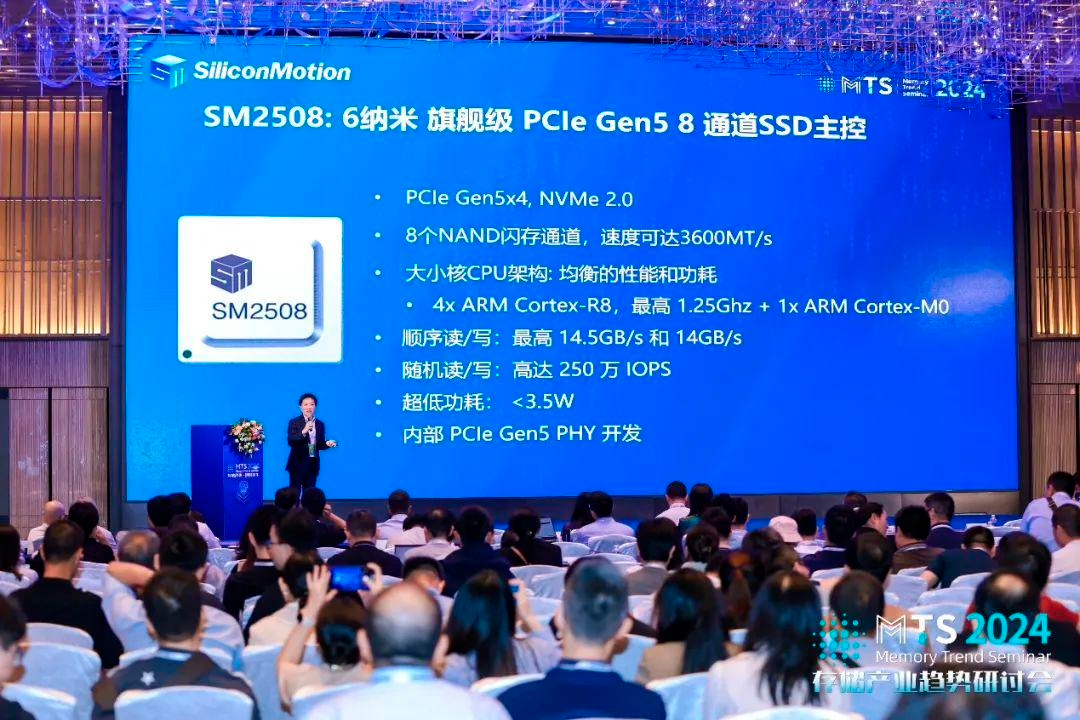
It's no secret that Silicon Motion is preparing its SM2508 PCIe 5.0 SSD controller to power the best SSDs. The company shared more information on SM2508 at the Memory Trend Seminar 2023 event in Shenzhen, China.
A previous roadmap showed that the SM2508 would be made on a 12nm manufacturing process. Silicon Motion has officially confirmed that the upcoming PCIe 5.0 SSD controller leverages the TSMC's 6nm EUV manufacturing process. The SM2508 is on a more advanced process node than the competition, such as the PS5026-E26 and the Innogrit IG5666 PCIe 5.0 SSD controllers on the 12nm process node. The 6nm process node offers a 45% power reduction compared to the 12nm process node, and up to 20% less logic cell area than the 7nm process node.
The SM2508 features an Arm-based processor with four Cortex-R8 cores up to 1.25 GHz and one Cortex-M0 core. The configuration provides a balance between performance and power consumption. It contrasts with the Phison E26, which has a dual-CPU design with Cortex-R5 cores in conjunction with Phison's CoXProcessor 2.0 accelerators. Nonetheless, Silicon Motion's material mentions the usage of an intelligent PMC (power management controller) on the SM2508 to assess and manage the power so that the chore isn't placed on the Arm chip.
Like most PCIe 5.0 SSD controllers, the SM2508 features an eight-channel design supporting DRAM speeds up to 3,600 MT/s — leaping over the Phison E26, which tops at 2,400 MT/s. It supports both TLC and QLC NAND flash chips. According to Silicon Motion, the SM2508 delivers sequential read and write speeds up to 14.5 GB/s and 14 GB/s, respectively. It seems that the company optimized the sequential read performance on the SM2508 since it was previously reported to only hit 14 GB/s. Random read-and-write performance is rated for up to 2.5 million IOPS. In comparison, the Phison E26 has peaked at 14 GB/s with Micron's highly sought-after B58R 2,400 MT/s NAND.
While the SM2508 is ultra-fast on paper, the PCIe 5.0 SSD controller's greatest attraction is its super low power consumption — Silicon Motion claims that the SM2508 draws less than 3.5W. The issue, however, is that the manufacturer doesn't specify whether that value corresponds to the SM2508's idle, average, or peak power draw. For comparison, the Phison E26 draws around 5W, meaning the SM2508 seemingly consumes up to 30% less power. It's plausible that SM2508-based SSDs may not require the same grade of active cooling as Phison E26-powered drives. However, we'll need to test the former when the SSDs become available because the SSD controller's power consumption is only one aspect since you still have to factor in the power draw from the 3D NAND and DRAM.
The SM2508 sounds excellent, but we should wait for reviews before concluding because real-world performance doesn't always equal what's on paper. The SM2508 is scheduled to come out before the end of this year, so we won't have to wait long to see if Silicon Motion's SSD controller can disrupt the PCIe 5.0 market, which predominately utilizes the Phison E26. Unfortunately, laptop users will have to wait longer as Silicon Motion doesn't foresee PCIe 5.0 SSDs making their way to laptops until late 2024.







